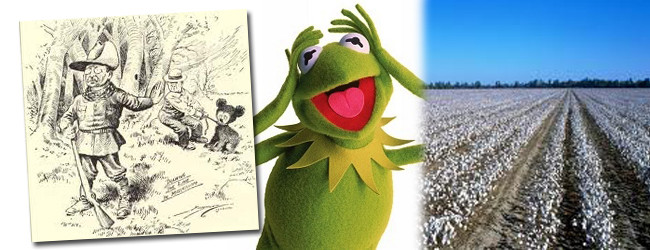 The Mississippi Delta is undeniably the place where the blues was born. In time, that music would birth Rock n Roll in those very fields, as well as R&B, soul, and nearly every facet of popular music. Alongside it’s music, the delta shaped American culture in some of the most fascinating and intriguing ways, including hunger, poverty, teddy bears, and a famous green frog puppet.
The Mississippi Delta is undeniably the place where the blues was born. In time, that music would birth Rock n Roll in those very fields, as well as R&B, soul, and nearly every facet of popular music. Alongside it’s music, the delta shaped American culture in some of the most fascinating and intriguing ways, including hunger, poverty, teddy bears, and a famous green frog puppet.
On November 14th, 1902, President Theodore Roosevelt went on a bear hunting expedition in the Mississippi Delta near the creatively named Onward, Mississippi. About eleven years later, Muddy Waters would be born less than a mile away. The Mississippi Governor, Andrew H. Longino, had invited the President on the hunt for the wild bears that used to roam the Delta’s fields, but after three days of hunting, Roosevelt was the only one that hadn’t spotted a bear.
The president’s guides trapped a black bear and tied it to a tree, calling for Roosevelt to come shoot it. The President, a famed big game hunter, called the idea unsportsmanlike, and refused to shoot the bear. News spread across the country about Roosevelt’s act, which captured the American imagination and solidified popular opinion of the 26th president as a rugged and masculine cowboy with an unshakable sense of fairness.
In Brooklyn, a candy shop owner was inspired to sell stuffed bears after seeing a cartoon depicting the president’s gesture and asked the president for permission to call them “Teddy’s Bears” to honor the occasion. The bears were a huge hit, and the teddy bear has forever been a part of the popular American lexicon.
The teddy bear wasn’t the only popular stuffed animal to come from the delta. Not forty miles up Highway 61 in Leland, Mississippi, where a young Johnny Winter’s father was mayor, bluesman James “Son” Thomas lived, and the Highway 61 Blues Museum resides, Jim Henson created a puppet frog from a discarded green coat and ping pong ball halves for eyes. Supposedly named after another Leland, MS resident, Henson called the frog “Kermit”. Kermit The Frog was first introduced to television in 1955 and soon after, would be the main character in what became The Muppet Show and Sesame Street.
In 1967, Senator Robert F. Kennedy, who almost exactly a year later would declare his intention to run for President of the United States, visited the Mississippi Delta in a widely publicized exploration of the nation’s poverty. Kennedy stayed at the Riverside Hotel in Clarksdale, Mississippi — the former hospital where Bessie Smith died, the famous song “Rocket 88” was born, and where bluesmen like John Lee Hooker and Muddy Waters lived for long periods of time. Blues tourists to the delta are likely familiar with Riverside — the hotel, now in it’s third generation of family management, is a popular and historically rich authentic delta hotel.
Kennedy’s trip finally shed widespread light on the rampant and desperate conditions of the country’s most poor area through the press that followed him. He later said, “There are children in the Mississippi Delta whose bellies are swollen with hunger … Many of them cannot go to school because they have no clothes or shoes.” His experiences with the delta’s poverty and destitution would cement his social conscience, and gave Kennedy a passionate voice for the nation’s underprivileged and hungry that would become his popular presidential platform.
“I saw Senator Kennedy, who was dressed in a beautiful pinstripe, charcoal-gray suit,” wrote Journalist George Lapides while covering the Senator’s trip, “sitting on a dirt floor with a child about 18-months old with a distended stomach. Senator Kennedy had him sitting on his lap and tears were coming down Senator Kennedy’s eyes.”
Less than three months after declaring his presidential candidacy, Senator Robert F. Kennedy would be shot dead in a ballroom kitchen in Los Angeles.
Blues fans and music lovers continue to make the “pilgrimage” to the Mississippi Delta for it’s warm and inviting festivals and colorful characters, as well as it’s history and, of course, it’s music. But for travelers and adventurers that either dig or stumble upon it’s vast hidden history, it may become clear that in the delta’s deep and rich soil holds some of the most significant events that shaped American culture.

